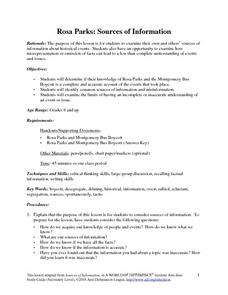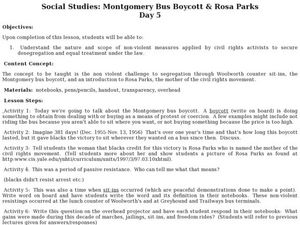Anti-Defamation League
Rosa Parks: Sources of Information
Young scholars show what they know about Rosa Parks and the incident on one of the buses in Montgomery, Alabama. Groups discuss and identify where they receive most of their information. They examine the importance of having a complete...
Roy Rosenzweig Center for History and New Media
Rosa Parks and the Montgomery Bus Boycott
Participants examine two documents related to Rosa Parks and the bus boycott, sources that challenge some of the commonly held preconceptions about Rosa Parks. They then respond to discussion questions to reinforce understanding and...
PBS
Rosa Parks: Civil Rights Activist
Scholars examine the courageous efforts made by civil rights activist, Rosa Parks. Discussion questions and a brief writing assignment follows a short film. A photograph and a silent film delve deeper into Park's history and three...
Historical Thinking Matters
Rosa Parks: 1 Day Lesson
You've heard of the historical moment when Rosa Parks refused to give up her seat on a bus, but did you know that some historical accounts disagree on where she sat? Investigate this query with your young historians, and practice...
Curated OER
Rosa Parks
Second graders discover who Rosa Parks was and the significance of her role in Black History. Students place events in Rosa Park's life in chronological order.
Curated OER
Civil Rights: Rosa Parks Centers
Research the Montgomery Bus Boycott and Rosa Parks. Set up different centers and have learners rotate through the activities aimed at researching Rosa Parks. They read The Bus Ride that Changed History: The Story of Rosa Parks, write a...
Historical Thinking Matters
Rosa Parks: 5 Day Lesson
What led to the success of the Montgomery Bus Boycott, and how might historians approach this question differently? This rich series of lessons includes a short introductory video clip, analysis of six primary source documents, and...
Curated OER
Rosa Parks Changed the Rules
Learners listen to a story about Rosa Parks and examine the bus seating rules of the 1950s. In this civil rights movement instructional activity, the teacher reads students a book about Rosa Parks, then learners complete a worksheet...
Curated OER
Rosa Parks and the Montgomery Bus Boycott
Students dramatize incident that started the civil rights movement of the 1950s and 1960s: Rosa Parks's refusal to give up her seat on a bus in Montgomery, Alabama.
Curated OER
Rosa Parks Changed the Rules
Students complete a diagram of the Montgomery bus that carried Rosa Parks into the history books. They read about Rosa Park's contributions to the Civil Rights movement. They role play Rosa Park's refusal to move to the back of the bus.
Curated OER
Remembering Rosa
Students research and profile figures in American civil rights such as Rosa Parks, from 1955-68, to create commemorative posters.
Curated OER
Rosa Parks
Students examine the actions of Rosa Parks. They identify the reasons why philanthropy is good for the community and individuals. They write a letter to someone they admire because of their qualities.
Curated OER
Rosa Parks
Students identify the heroic actions of Rosa Parks. In this African-American lesson, students read the book, Rosa Parks: My Storyand create a timeline of the events from the biography.
Curated OER
The Movement Before the Movement: Civil Rights Activism in the 1940s
Many educators focus on the civil rights movement as it occurred after Rosa Parks incited the bus boycott. Extend the understanding of the fight for civil rights in the United States with this post-WWII instructional activity. Learners...
Curated OER
Rosa Parks Autobiography
Students write the story of Rosa Parks from the perspective of someone who was sitting on the bus that day. In this Rosa Parks/biography lesson, students read the story of Rosa Parks and discuss it in small groups. After each group...
Curated OER
Montgomery Bus Boycott & Rosa Parks Day 5
Students study the Montgomery Bus Boycott. In this American Civil Rights lesson, students listen to a lecture about segregation, Rosa Parks, and the bus boycott. Students discuss passive resistance and its effectiveness.
Education City
Black History Month
Enhance Black History Month with a twenty-page resource designed to boost scholars' knowledge of the great accomplishments made by African Americans. Learners take in fun facts about famous inventors such as George Washington Carver and...
Curated OER
Claudette Colvin: Twice Toward Justice
Use the historical account of Claudette Colvin to study civil rights and connect past injustices to modern issues. As learners read, they examine chapter titles, record quotes, and participate in discussion. Next, they research active...
Stanford University
Lesson Plan: Montgomery Bus Boycott
Most of us have heard of Rosa Parks, the Montgomery Bus Boycott, and Martin Luther King, Jr. But what about Claudette Colvin, Virginia Durr, Freedom Summer, or the Birmingham Children's Crusade? A five-lesson unit prompts class members...
Curated OER
Active Viewing: Eyes on the Prize "Awakenings"
Dive deeper into the Montgomery Bus Boycott with this multi-stage lesson, centered on the essential question: Why did the boycott last so long? Historians investigate the Jim Crow south through a video clip (not included), then analyze...
Curated OER
An Act of Courage, The Arrest Records of Rosa Parks
High schoolers research accounts on Rosa Parks and look for differences between the modern form and an older report on Parks. They discuss why information about race and nationality are collected on these and other forms.
Curated OER
What is Prejudice?
Students tell who Rosa Parks was and what she did to become famous and what state she did it in, and who Martin Luther King Jr. was, why he was important in history, and how we was connected with Rosa Parks.
Curated OER
Nonviolence the Road to Freedom
Eleventh graders discuss the use of nonviolence. In this civil rights movement activity, 11th graders write a journal entry on the differences between Rosa Parks and Martin Luther King Jr., discuss nonviolence and create a poster...
Curated OER
"Rosa Parks"
Pupils use information from the Time 100: Rosa Parks Web site to explore Parks's decision to challenge Montgomery's segregation laws. They answer four questions and apply this information by delivering an introductory speech.

























